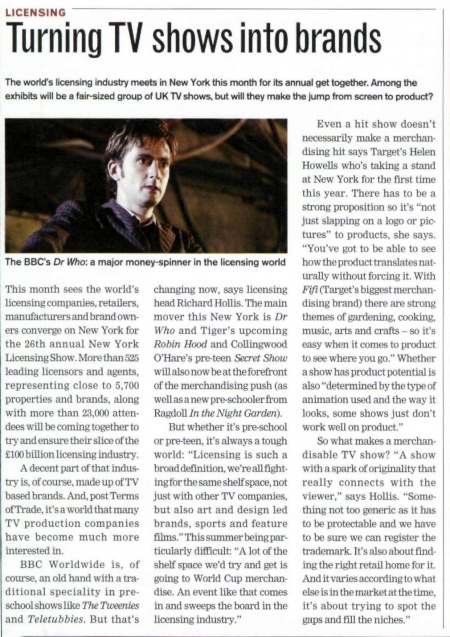Turning TV shows into brands
- Publication: Televisual
- Date: June 2006
- Author:
- Page: 11
- Language: English
The world's licensing industry meets in New York this month for its annual get together. Among the exhibits will be a fair-sized group of UK TV shows, but will they make the jump from screen to product?
This month sees the world's licensing companies, retailers, manufacturers and brand owners converge on New York for the 26th annual New York Licensing Show. More than 525 leading licensors and agents, representing close to 5,700 properties and brands, along with more than 23,000 attendees will be coming together to try and ensure their slice of the £100 billion licensing industry.
A decent part of that industry is, of course, made up of TV based brands. And, post Terms of Trade, it's a world that many TV production companies have become much more interested in.
BBC Worldwide is, of course, an old hand with a traditional speciality in preschool shows like The Tweenies and Teletubbies. But that's changing now, says licensing head Richard Hollis. The main mover this New York is Dr Who and Tiger's upcoming Robin Hood and Collingwood O'Hare's pre-teen Secret Show will also now beat the forefront of the merchandising push (as well as anew pre-schooler from Ragdoll In the Night Garden).
But whether it's pre-school or pre-teen, it's always a tough world: "Licensing is such a broad definition, we're all fighting for the same shelf space, not just with other TV companies, but also art and design led brands, sports and feature films." This summer being particularly difficult "A lot of the shelf space we'd try and get is going to World Cup merchandise. An event like that comes in and sweeps the board in the licensing industry."
Even a hit show doesn't necessarily make a merchandising hit says Target's Helen Howells who's taking a stand at New York for the first time this year. There has to be a strong proposition so it's "not just slapping on a logo or pictures" to products, she says. "You've got to be able to see how the product translates naturally without forcing it. With Fifi (Target's biggest merchandising brand) there are strong themes of gardening, cooking, music, arts and crafts - so it's easy when it comes to product to see where you go." Whether a show has product potential is also "determined by the type of animation used and the way it looks, some shows just don't work well on product"
So what makes a merchandisable TV show? "A show with a spark of originality that really connects with the viewer," says Hollis. "Something not too generic as it has to be protectable and we have to be sure we can register the trademark. It's also about finding the right retail home for it. And it varies according to what else is in the market at the time, it's about trying to spot the gaps and fill the niches."
Caption: The BBC's Dr Who: a major money-spinner in the licensing world
Disclaimer: These citations are created on-the-fly using primitive parsing techniques. You should double-check all citations. Send feedback to whovian@cuttingsarchive.org
- APA 6th ed.: (June 2006). Turning TV shows into brands. Televisual p. 11.
- MLA 7th ed.: "Turning TV shows into brands." Televisual [add city] June 2006, 11. Print.
- Chicago 15th ed.: "Turning TV shows into brands." Televisual, edition, sec., June 2006
- Turabian: "Turning TV shows into brands." Televisual, June 2006, section, 11 edition.
- Wikipedia (this article): <ref>{{cite news| title=Turning TV shows into brands | url=http://cuttingsarchive.org/index.php/Turning_TV_shows_into_brands | work=Televisual | pages=11 | date=June 2006 | via=Doctor Who Cuttings Archive | accessdate=27 December 2025 }}</ref>
- Wikipedia (this page): <ref>{{cite web | title=Turning TV shows into brands | url=http://cuttingsarchive.org/index.php/Turning_TV_shows_into_brands | work=Doctor Who Cuttings Archive | accessdate=27 December 2025}}</ref>
